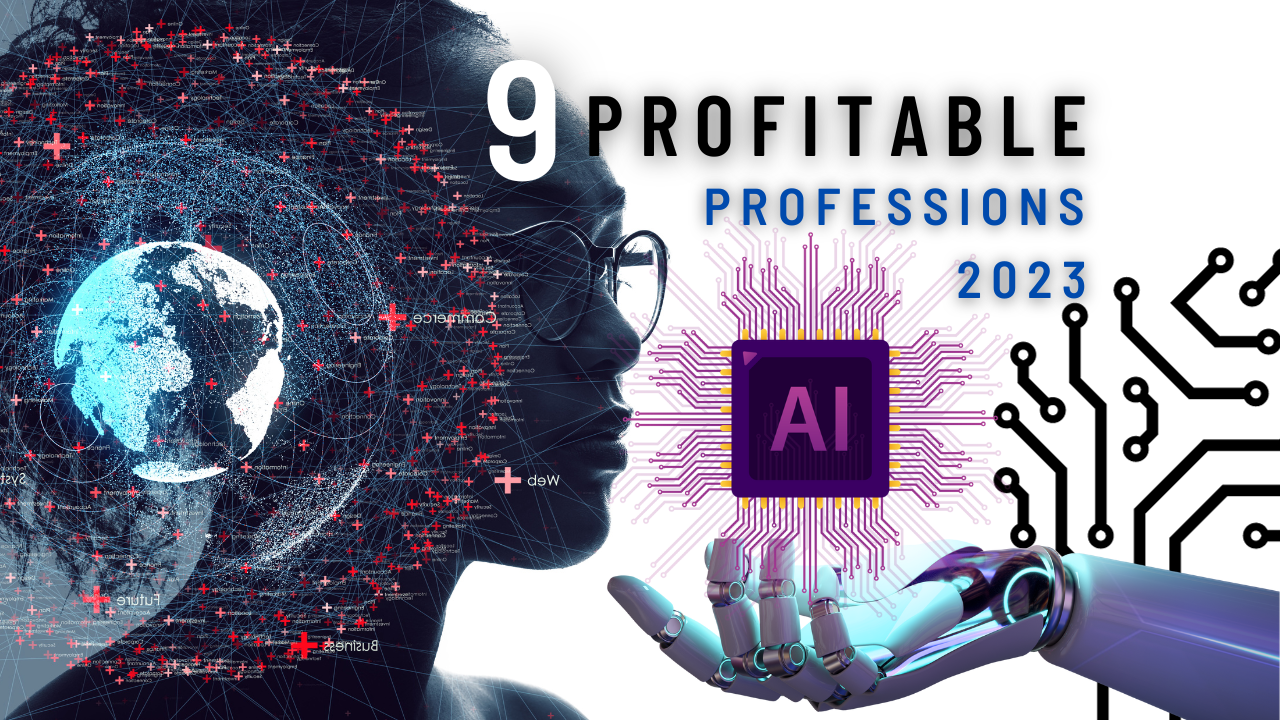
Artificial Intelligence (AI) has revolutionized our world in many ways, altering how we interact with technology and how businesses operate. As a result, AI careers are increasingly attracting technology enthusiasts.
Consequently, the demand for skilled AI professionals has been consistently growing, making this field one of the most trending and lucrative sectors in today’s economy. In this article, we will delve into the most profitable and popular AI careers, as well as the skills required to excel in these exciting fields.
The most in-demand artificial intelligence professions
By 2025, it is projected that 100 million people will be working in the field of artificial intelligence. Here are some of the most lucrative and popular AI careers in 2025:
1. Machine Learning (ML) Engineer
Engineers in Machine Learning are responsible for designing, developing, and implementing machine learning algorithms that enable computer systems to learn from data and make autonomous decisions. They work on projects ranging from image recognition to consumer demand prediction and product recommendation.
Required Skills:
Proficiency in programming languages such as Python and R. In-depth understanding of mathematics and statistics. Experience in data processing and manipulation. Knowledge of machine learning frameworks such as TensorFlow and PyTorch.
Salary and Career Opportunities:
As a Machine Learning engineer, you have the opportunity to work in AI startups, tech giants, and consulting firms. The average salary in France is approximately €65,000 per year.
2. Data Scientist:
Data scientists are responsible for collecting, cleaning, and analyzing data to extract valuable insights and make evidence-based decisions. They often use machine learning techniques to solve business problems, identify trends, and create predictive models.
Required Skills:
Mastery of data analysis tools such as Python, R, and SQL. Understanding of statistics and machine learning. Ability to effectively communicate results to non-technical stakeholders.
Salary and Career Opportunities:
As a Data Scientist, you can work in various sectors, including technology, finance, healthcare, and commerce. The average salary for a Data Scientist in France is around €60,000 per year at the beginning of their career.
3. Big Data Engineer:
Big Data engineers are responsible for designing, developing, and managing systems that collect, store, and analyze massive amounts of data. They use technologies such as Hadoop, Spark, and NoSQL to process this data.
Required Skills:
Mastery of Big Data technologies like Hadoop and Spark. Knowledge of NoSQL databases. Programming skills for data processing.
Salary and Career Opportunities:
Big Data engineers enjoy average salaries of approximately €65,000 per year in France, with excellent career prospects. They are in demand in various sectors, including AI startups, large tech companies, and data consulting firms, due to their expertise in managing and analyzing massive datasets.
4. Artificial Intelligence Engineer:
Artificial Intelligence engineers are professionals responsible for designing computer systems and software programs capable of replicating human cognitive functions, such as natural language understanding, solving complex problems, and decision-making. They are often involved in creating chatbots, recommendation systems, and virtual assistants, with the goal of creating intelligent systems that interact naturally with users.
Required Skills:
Strong programming and software development skills. In-depth knowledge of machine learning, natural language processing (NLP), and computer vision. Ability to solve complex AI-related problems. Experience with libraries like NLTK and spaCy for NLP.
Salary and Career Opportunities:
Generally, the average salary for an AI Engineer in France ranges from €60,000 to €80,000 per year at the beginning of their career. Career opportunities for AI Engineers in France are constantly expanding, with employment prospects in various sectors, including technology, healthcare, finance, industry, and even the public sector.
5. Robotics Engineer:
Robotics engineers design, develop, and program autonomous robots capable of performing a variety of tasks. They can work on projects ranging from industrial robots to autonomous drones and service robots. Their expertise in mechanics, electronics, and programming is essential for creating intelligent and autonomous machines.
Required Skills:
In-depth knowledge of mechanics, electronics, and programming. Skills in reinforcement learning for training autonomous robots. Ability to solve navigation and perception problems.
Salary and Career Opportunities:
As a Robotics Engineer, the average salary in France is approximately €62,000 per year at the beginning of your career. Career opportunities for Robotics Engineers in France are diverse, with opportunities in high-tech companies, manufacturing industries, research and development labs, and the medical robotics sector.
6. Natural Language Processing (NLP) Engineer:
NLP engineers specialize in developing systems capable of understanding and generating human language. They work on applications ranging from automatic translation to text generation. Their expertise in language models, recurrent neural networks (RNNs), and transformers is crucial for creating advanced NLP systems.
Required Skills:
Excellent programming skills, especially in Python. In-depth knowledge of language models, recurrent neural networks (RNNs), and transformers. Experience with libraries such as spaCy and Transformers.
Salary and Career Opportunities:
In France, NLP engineers enjoy competitive salaries, typically ranging from €45,000 to €75,000 per year at the beginning of their careers. As an NLP engineer, you have the opportunity to work in media companies, social media platforms, and e-commerce. Expertise in natural language processing is increasingly valuable in a world where linguistic automation is gaining importance.
7. Deep Learning Engineer:
Deep Learning engineers focus on developing deep neural networks to solve complex problems. They are often involved in cutting-edge AI research and development projects. Their expertise in mathematics, linear algebra, and tensor calculus is crucial for designing and training deep neural networks.
Required Skills:
Strong math skills, especially in linear algebra and tensor calculus. Mastery of deep learning libraries like TensorFlow and PyTorch. Ability to design and train deep neural networks.
Salary and Career Opportunities:
As a Deep Learning Engineer, you have the opportunity to work in various fields, including AI research, computer vision, healthcare (AI-assisted medical diagnosis), robotics, autonomous vehicles, cybersecurity, finance (financial data analysis), and many other sectors. The average salary in France generally ranges from €50,000 to €80,000 per year at the beginning of your career.
8. AI Ethics Engineer:
AI raises important ethical questions, such as algorithmic bias and data privacy. AI Ethics engineers work on designing systems that adhere to high ethical standards, ensuring that AI systems are fair, equitable, and transparent.
Required Skills:
In-depth understanding of ethical issues related to AI. Ability to design algorithms and models that prevent discrimination. Knowledge of data protection regulations and standards.
Salary and Career Opportunities:
As an AI Ethics Engineer, you have the opportunity to work in AI-focused companies, government organizations, research institutions, and consulting firms. The average salary in France is approximately €57,000 per year.
9. Robotic Process Automation (RPA) Specialist:
RPA specialists develop software robots capable of automating repetitive tasks in businesses. They work on automating business processes, allowing companies to improve their operational efficiency. Their expertise in RPA development is essential for creating intelligent robots.
Required Skills:
Proficiency in RPA development tools such as UiPath and Automation Anywhere. Understanding of business processes and automation. Ability to collaborate with project management teams.
Salary and Career Opportunities:
In France, RPA specialists are in high demand, reflected in competitive salaries, ranging from €50,000 to €75,000 per year at the beginning of their careers. Career opportunities for these professionals are diverse, with job prospects in companies of all sizes, financial institutions, consulting firms, and sectors such as healthcare and logistics.
Why are careers in AI booming?
Artificial intelligence is not just a passing wave; she is here to stay. The exponential growth of data and the need to analyze it efficiently has fueled unprecedented demand for AI professionals. Here are some reasons why AI professions are booming:
- Datafication of Everything Everything is becoming data: from online purchases to social media interactions, all is recorded. This generates an enormous amount of data that needs to be analyzed and interpreted, requiring expertise in AI.
- Automation and Efficiency Businesses are seeking ways to become more efficient and cost-effective. AI offers solutions to automate repetitive tasks and make data-driven decisions.
- Data-Driven Decision-Making AI enables companies to make more informed decisions through advanced data analysis. From predicting market trends to identifying risks, AI has become an essential component of strategic decision-making.
- Technological Advancements Advances in computing power, machine learning, and neural networks have made AI applications more effective and accessible.
- Interdisciplinarity The field of AI is inherently interdisciplinary, combining elements of mathematics, computer science, psychology, and even philosophy. This versatile nature attracts a variety of talents and skills.
- Ethical Imperative With the growth of AI also comes an ethical responsibility. Issues related to data privacy, algorithmic bias, and employment require serious ethical considerations, paving the way for roles such as AI ethicists.
In summary, the current momentum around artificial intelligence creates numerous opportunities for those looking to embark on a future-proof career and specialize in AI-related fields.
Skills needed for careers in AI
After listing the most in-demand AI jobs, it’s time to explore the essential skills required to excel in the field of artificial intelligence.
- Programming Proficiency: Mastery of programming languages like Python, R, and Java is fundamental. Proficiency in at least one of these languages is crucial.
- Mathematics and Statistics Knowledge: Mathematics and statistics serve as the engine that powers AI algorithms. They are indispensable for understanding and developing AI models.
- Understanding of Machine Learning Algorithms: Machine learning forms the core of AI. You must know how AI models and algorithms function.
- Data Management Skills: Data is the fuel of AI. Being able to manipulate and analyze data is a must.
- Business Acumen and Strategy: Understanding how your work aligns with the overall strategy of the company is what sets you apart.
- Communication Skills: In AI, communication is paramount. You work in teams, so being able to express yourself clearly and comprehend others’ needs is crucial.
- Curiosity and Adaptability: The field of AI is in constant flux. Curiosity and adaptability are not optional; they are essential.
- Critical Thinking: The ability to critically evaluate information or situations is vital, especially when working with data and algorithms.
- Problem-Solving Skills: In the realm of AI, you will often face complex challenges. Strong problem-solving abilities will help you navigate these situations effectively.
Academic and professional paths to work in AI
You have the skills, but how do you convert them into a fulfilling role in the booming field of artificial intelligence? Don’t worry; here are some milestones to guide you on your journey:
- Education Level:
- A degree in computer science, mathematics, statistics, or a related field is often the starting point. For more specialized roles, a master’s or a Ph.D. may be required.
- Certifications and Specialized Training:
- Certifications in machine learning, data analysis, or neural networks can help you stand out from other candidates.
- Hands-On Experience:
- Nothing beats practical experience. Internships, personal projects, and participation in hackathons can provide you with a significant advantage.
- Networking:
- Joining professional organizations or AI think tanks can help you establish valuable connections in the field.
- Continuous Skill Updating:
- Artificial intelligence is a rapidly evolving field, so it’s crucial to stay updated with the latest trends and technologies.
Tips for Getting Started in AI:
If you’re excited about the opportunities and job prospects in AI careers, here are some tips to help you embark on this exciting journey:
- Continuous Learning: AI is a constantly evolving field. Make sure to stay up-to-date by taking courses, reading articles, and participating in workshops.
- Build Your Portfolio: Create an impressive portfolio and include your personal AI projects to showcase your skills. This can grab the attention of potential employers.
- Contribute to Open Source Projects: Contributing to open-source projects is an excellent way to collaborate with other AI enthusiasts and gain practical experience.
- Work on Real-World Problems: Seek opportunities to apply AI to real-world issues. This will help you develop practical skills.
- Find a Mentor: An experienced mentor can guide you in your AI career, provide valuable advice, and expand your professional network.
- Attend Events and Conferences: Participate in AI-related conferences and events to meet other industry professionals and stay informed about the latest advancements.
- Join Online Groups: Online communities, such as forums and social media groups, are excellent places to ask questions, share knowledge, and make connections.
- Prepare for Interviews: If you’re applying for an AI job, make sure you have a strong understanding of fundamental concepts and prepare for technical interviews.
Conclusion
Artificial intelligence careers represent a rapidly expanding field, offering a plethora of exciting opportunities for those looking to venture down this path. Whether you’re interested in data science, machine learning development, AI research, or any related discipline, there is a variety of roles that allow you to showcase your skills and contribute to shaping the future of technology.
To succeed in the AI field, it’s crucial to develop strong technical skills, stay up-to-date with the latest advancements, and engage in practical projects. Additionally, networking and mentorship play a vital role in your professional growth. By utilizing available resources and learning platforms and by participating in events and discussion groups, you can expand your network and benefit from the guidance of experts.





